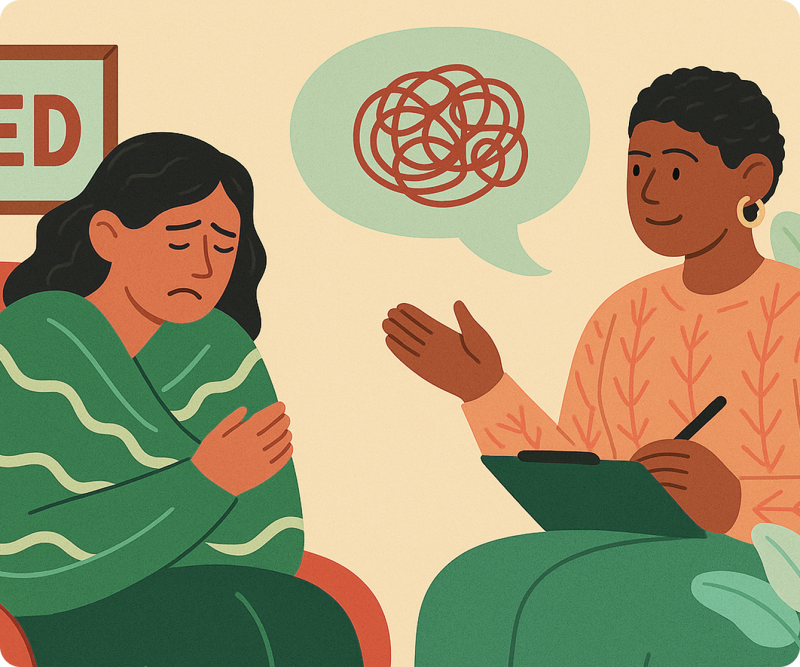
Healing from Emotional Trauma
Emotional trauma can be just as impactful as physical trauma, yet it’s often overlooked or minimised. Emotional trauma occurs when you experience overwhelming distress that exceeds your ability to cope, leaving lasting effects on your mental health, relationships, and sense of self.
Understanding Emotional Trauma
Unlike physical wounds that are visible, emotional trauma can be invisible to others while causing significant internal pain. Whether from childhood experiences, relationship betrayal, workplace bullying, or life-changing events, emotional trauma deserves recognition, validation, and proper treatment.
Emotional trauma can result from various experiences that feel overwhelming or threatening:
- Childhood emotional abuse, neglect, or invalidation
- Betrayal by trusted individuals such as partners, friends, or caregivers
- Bullying or harassment in school, workplace, or social settings
- Sudden loss of loved ones or relationship breakdowns
- Medical diagnoses or health crises
- Financial ruin or job loss that threatens security
- Discrimination, racism, or social marginalisation
- Witnessing violence or traumatic events
- Ongoing stress from caregiving responsibilities
- Identity-based rejection or family estrangement
The impact of emotional trauma isn’t determined by how others might view the event, but by your personal experience of overwhelm and distress.
Common Signs and Symptoms
Emotional trauma can manifest in numerous ways, and symptoms may appear immediately or emerge much later:
- Persistent feelings of sadness, anxiety, or emotional numbness
- Intrusive thoughts or memories about traumatic experiences
- Hypervigilance or feeling constantly on edge
- Difficulty trusting others or forming close relationships
- Low self-esteem or persistent feelings of worthlessness
- Sleep disturbances or recurring nightmares
- Difficulty concentrating or making decisions
- Emotional dysregulation or intense mood swings
- Avoidance of people, places, or activities that trigger memories
- Physical symptoms such as headaches, chronic pain, or digestive issues
- Substance use or other unhealthy coping mechanisms
These responses are normal reactions to abnormal experiences. Your trauma response is valid regardless of how others might perceive your experiences.
Pathways to Healing
Healing from emotional trauma is possible with appropriate support and evidence-based treatment. At Seed Psychology, our experienced psychologists specialise in trauma-informed therapies including Trauma-Focused CBT, EMDR, and Acceptance and Commitment Therapy (ACT).
Trauma therapy can help you:
- Process and integrate traumatic memories safely
- Develop healthy coping strategies for managing symptoms
- Challenge negative beliefs about yourself and the world
- Rebuild your sense of safety and personal agency
- Improve emotion regulation and stress management
- Strengthen your sense of identity and self-worth
- Develop healthier relationship patterns and boundaries
- Create meaning from your experiences and build resilience
Healing is not about forgetting what happened, but about reducing its power over your life and finding ways to move forward with strength and hope.
Your Journey to Recovery Matters
Emotional trauma is real trauma that deserves compassionate, professional support. You don’t have to minimise your experiences or struggle alone—healing is possible, and you deserve to feel whole again.
Our skilled, trauma-informed team at Seed Psychology understands the profound impact of emotional trauma and is here to support you with patience, empathy, and expertise. We believe in your capacity for healing and growth.
Connect with us to book an appointment with a psychologist in our Brunswick clinic or via telehealth Australia-wide.
Through connection,
change is possible
Our compassionate team at Seed Psychology is here to help you regain your wellbeing and navigate life’s challenges with greater confidence and clarity. Connect with us to book an appointment with a psychologist in our Brunswick clinic or via telehealth Australia-wide.
Available resources
Meet our amazing team of therapists
Our diverse team of psychologists offer individual, couples, and online therapy, as well as assessments. Beyond their expertise, they bring humanity and care, providing respectful, affirming support tailored to each person’s unique experience.
Freqeuently asked questions
-
Therapy is a shared process. While your Psychologist brings expertise, insight, and support, the most meaningful outcomes often come when you’re actively engaged in your own growth. This means being open and honest during sessions, reflecting between appointments, and being willing to try new approaches-even when it feels challenging. Therapy can take time, and progress isn’t always linear, but your commitment matters. Here are some ways to support your journey:
- Be open and honest with your Psychologist, even (and especially) if something feels hard to say.
- Give feedback if something doesn’t feel right or if your needs change.
- Stay open to exploring new ideas and practices within a safe, supportive space.
- Take notes or keep a journal to reflect on insights or patterns between sessions.
- Try to attend regularly-consistency is key to building momentum.
- Be kind to yourself. Growth can be uncomfortable at times, but that doesn’t mean you’re doing it wrong.
- Invest in your wellbeing outside of therapy by building habits and routines that nourish you.
Therapy is a courageous act of self-investment. By showing up and staying engaged, you create space for real and lasting change.
-
Our experienced team of Psychologists offers warm, evidence-based support that’s collaborative, inclusive and grounded in genuine understanding. We provide individual, relationship or family therapy for a wide range of concerns. Additionally, we offer couples therapy, online therapy, psychological assessments (including ADHD and Autism Spectrum Assessments), and workshops.
-
There’s no one-size-fits-all answer to how long therapy takes. At Seed Psychology, we tailor each intervention to your individual needs, goals, and circumstances. Some people come to therapy to navigate a specific challenge, like managing anxiety, adjusting to a life transition, or processing a relationship difficulty. Others may be seeking deeper emotional growth or support for longer-term concerns. Because of this, the number of sessions can vary. Many clients attend between 6 and 18 sessions, though some need fewer and others continue for longer. Your Psychologist will discuss an estimated treatment plan with you after your initial assessment and continue checking in over time to ensure it feels helpful and aligned with your goals. Ultimately, the pace and duration of therapy is something we navigate together, guided by your progress, preferences, and what feels right for you.
-
Consultations with a psychologist last between 50 and 60 minutes.
-
At Seed Psychology, your safety and wellbeing are our highest priorities. While we are here to support you through regular therapy sessions, we are not a crisis service and may not be available outside of scheduled appointments. If you or someone you care about is in immediate danger, experiencing a mental health crisis, or needs urgent support, it’s important to seek help straight away through the appropriate emergency or crisis services. You can find a list of trusted organisations and services here that can provide immediate support when you need it most.








